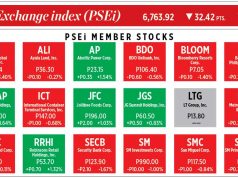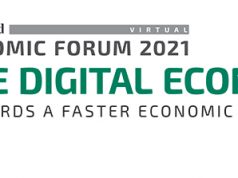BusinessWorld Economic Forum 2018 tackles realities of disruption
Last May 18, BusinessWorld, the most read and most respected business newspaper in the Philippines, triumphantly staged the third edition of its annual BusinessWorld Economic Forum in the Grand Ballroom of Grand Hyatt Manila, in Bonifacio Global City, Taguig City.
The forum, which has become one of the leading live platforms for discussing the key challenges and opportunities for the nation since its inception in 2016, brought together over 500 people from the private and public sectors. Titled “Disruptor or Disrupted? The Philippines at the Crossroads,” it delved into the forces and realities of disruption and their effects on industries and the country.
The keynote speech was delivered by Dennis A. Uy, one of the most exciting personalities in the Philippine business scene today. He is the founder, chairman and chief executive officer of Udenna Corp., a holding company which has interests in a wide variety of industries, including petroleum retail and distribution (Phoenix Petroleum Philippines, Inc.) and shipping and logistics (Chelsea Logistics Holdings Corp.)
“If I have learned anything in life, it is this: Change — which we millennials call disruption — is constant. If you cannot adapt, you will be left behind,” Mr. Uy said.
Change, he pointed out, is usually a positive thing for what he called “business insurgents,” or those that rebel against the incumbents and think that there are better ways to do business, especially with technology. The same can’t be said for the incumbents, also known as the established businesses, because they refuse to see the changes in the landscape and consumer preference, so they get left behind, Mr. Uy said.
“Change is coming, and we have no choice but to embrace it. If we do not evolve, we become extinct. We will be the products of yesterday, instead of being the brands of the future.”
Mr. Uy’s speech was succeeded by a series of talks by some of the esteemed personalities in their respective industries. The session devoted to big data and Philippine competitiveness was opened by Ret. Gen. Eliseo M. Rio, Jr., acting secretary of the Department of Information and Communications Technology. He pointed out that all aspects of human life are now controlled by information and that information is the new oil.
Kristine Romano, managing director of McKinsey & Company in the Philippines, helped debunk and prove some myths about digital. It is not true that digital is creating value across sectors, that only digital natives can successfully disrupt, and that strategy no longer matters in digital. It is true, however, that digital is a “winner takes all” game, that disruptors have the first-mover advantage, and that culture change is critical.
In her talk, Erika Fille T. Legara, professor at the Asian Institute of Management, noted that for the Philippines to remain globally competitive, it has to disrupt itself. For the country to adapt to disruption, there’s a need to spark the interest of various stakeholders and to collaborate with each other.
In the following session, which revolved around artificial intelligence, e-commerce and cashless transactions, Pia Bernadette Roman-Tayag, managing director of the Inclusive Finance Advocacy Office at Bangko Sentral ng Pilipinas, reminded the audience that many parts of the country remain unbanked; in fact, as much as 34% of Philippine cities and municipalities have never seen a bank.
Edwin R. Bautista, president and CEO of Union Bank of the Philippines, said that banks today have two options with the entry of fintech or financial technology: disrupt themselves or perish. UnionBank is already mining bitcoin, he said, adding that blockchain is the future.
Meanwhile, as companies leverage on artificial intelligence (AI), they gain more information about their customers, particularly their pain points, according to Lito Tayag, country managing director of Accenture, Inc. (Philippines). But he advised companies to raise their AI systems to be more productive as the capabilities and impact of these systems grow.
An important ingredient for engaging customers in the age of disruption for Walt Steven Young, founder and CEO of Adobomall, is authenticity, which a story that’s unique to a brand can enhance. But Adobomall is also taking advantage of available technology as Mr. Young shared that they are in the process of patenting a shopping experience powered by augmented reality.
Opening the third session, which focused on finding opportunities in the age of disruption, Orlando B. Vea, president and CEO of Voyager Innovations, told the audience “a fact of life:” today’s disruption is tomorrow’s business as usual. But he noted that to lead in the age of disruption, one must think in terms of platform.
GCash, a micropayment service of Mynt (Globe Fintech Innovations, Inc.), is one example. Mynt’s CEO, Anthony Thomas, said that now, one can even purchase load credits and pay bills on Facebook Messenger through GCash.
Brian Cu, country head of Grab Philippines, said that disruptors shouldn’t forget about their roots. He also shared things his company had learned about disruption: remaining agile, collaborating with stakeholders, focusing on growth without forgetting the basics and innovating.
For Miguel Cuneta, co-founder and chief community officer of Satoshi Citadel Industries, companies like Grab are doing an important thing in the age of disruption — creating useful services. But he doesn’t believe that there is a real age of disruption since disruption is a constant process in which the market chooses what’s beneficial to itself.
In the fourth and final session, which revolved around the workplace and disruption, Arthur R. Policarpio, co-founder and CEO of Mobext Philippines, said marketplace companies, like freelancing Web sites, will continue to thrive as the sharing economy grows. And leaders in this day and age, he noted, must be students all over again, be business model engineers and be architects of company vision in the digital world at the same time.
Luis Miguel O. Aboitiz, executive vice-president and chief operating officer of the Corporate Business Group of Aboitiz Power Corp., noted that since things are changing fast and technologies are getting better, businesses should expect a reorganization every two years.
The workplace is already changing with the entry of more and more millennials. But according to Camille A. Villar, managing director of Vista Land & Lifescapes, Inc., people tend to overly generalize traits attributed to them. Profiling a generation, she said, should inform but not shape one’s thinking. She recommended seeking millennials who have high levels of emotional intelligence and not necessarily high grades, to create a culture of mutual trust and respect in the workplace.
The BusinessWorld Economic Forum 2018 was presented by BusinessWorld Publishing Corp., with co-presentors LT Group, Inc., GT Capital Holdings, Inc., and SM Investments Corp.; platinum sponsors PLDT and Manila Electric Company; gold sponsors Ayala Corp., BDO Unibank, Inc., Megaworld Corp., Phoenix Petroleum, Udenna Corp., and UnionBank; silver sponsors Aboitiz Power Corp., Asian Institute of Management, FWD Philippines, Metro Pacific Investments Corp., Mundo Builders, San Miguel Corp., and St. Luke’s Medical Center; bronze sponsors Development Bank of the Philippines, Land Bank of the Philippines, Mastercard, National Home Mortgage Finance Corp., Philippine Amusement and Gaming Corp., Sun Life Financial Philippines, Voyager Innovations, Wilcon Depot, Inc., and Cross; media partners The Philippine Star, PhilStar Global, and One News; and event partners Fiera de Manila and ESET.



